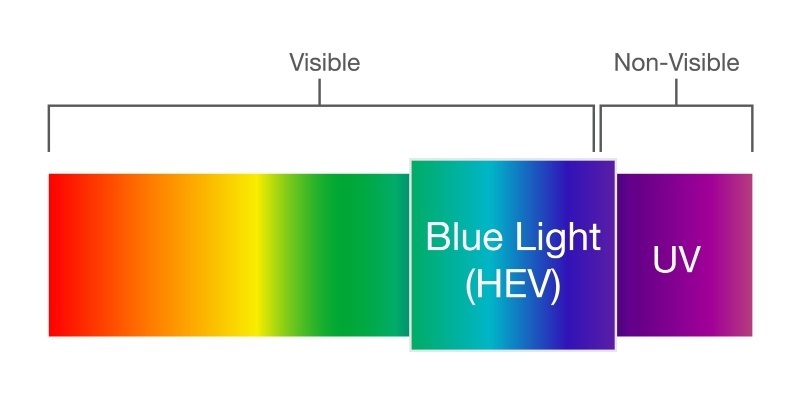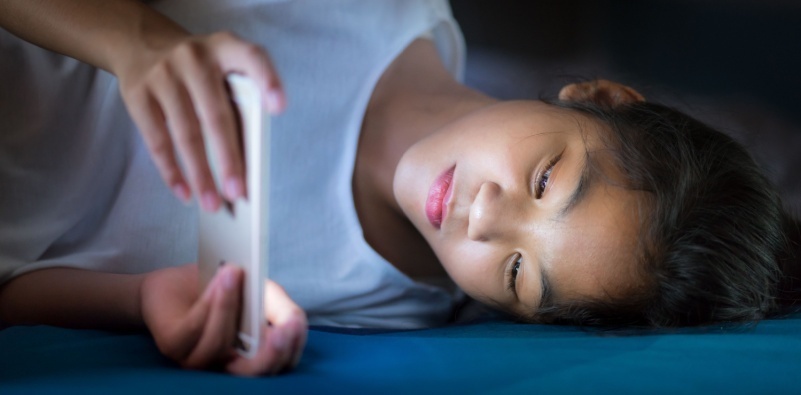Do Blue Light Lenses Make a Difference?
If you’re a student, chances are you spend a good chunk of your day staring at screens. Between Zoom lectures, online research, TikTok breaks, and late-night Netflix binges, your eyes barely get a break. That’s where blue light lensescome in — designed to make screen time more comfortable and help reduce the eye fatigue so many students experience.
You’re not alone. According to research, the average screen time for adults in the U.S. is over 7 hours a day, and for students, it can be even higher. With all this screen time, you might start noticing symptoms like headaches or eye dryness.
So, the big question is: what do blue light lenses do, and do they really help? Are they simply a trendy accessory, or can they actually improve your eye comfort? Let’s explore.
What is blue light?

Blue light is a type of visible light — part of the spectrum your eyes naturally take in every day. The biggest source of blue light is the sun, which actually plays a vital role in regulating your body’s internal clock (known as the circadian rhythm).
But here’s the catch: digital devices like laptops, tablets, and smartphones also give off blue light, particularly the high-energy blue-violet kind. And with students spending hours on these devices, the extra exposure can lead to some unwelcome eye fatigue.
The effects of blue light

It’s important to know that blue light itself isn’t inherently bad and won’t permanently affect your eyes. But, when you’re exposed to it for long hours at a time — like most students these days — it can contribute to discomfort and sore eyes.
You might notice your eyes feeling tired, dry, or unfocused after a marathon study session or late-night scrolling. That’s where blue light lenses come in. They’re designed to reduce the amount of blue-violet light reaching your eyes, potentially easing some of that strain.
What do blue light lenses do?

So, what do blue light lenses do exactly? These lenses selectively filter out some of the higher-energy blue light, aiming to make your screen time more comfortable. Think of them as a soft cushion between your eyes and the glow of your devices.
While experiences vary, many students report feeling less tiredness and eye strain when wearing them, especially during those late-night study marathons or back-to-back lectures online. The best part? They’re suitable whether you need prescription glasses or just want a pair for everyday screen comfort.
Where they fit in real life: study sessions, scrolling, and Netflix

Student life means heavy screen use in all sorts of ways. Whether you’re buried in assignments or just trying to unwind, there are tons of moments when blue light lenses could make things a little easier on your eyes.
Here are some common scenarios where blue light lenses might come in handy, both in academic and non-academic settings:
- Late-night study marathons
If you’re cramming at the library with your laptop glowing into the early hours, blue light lenses can help take the edge off that eye strain.
- Lecture replays in bed
Rolling through recorded classes under the covers? These lenses can soften the glare and make those 8 AM topics feel slightly less brutal.
- Long research sessions
Spending hours clicking through sources or editing that group project? A little filtering might go a long way in keeping your tired, sore eyes from giving up on you.
- Endless scrolling between classes
Whether it’s catching up on texts or getting lost in memes, these quick scroll sessions add up. Blue light lenses may help cut down eye fatigue.
- Evening downtime
Streaming, gaming, or watching “just one more episode” before bed? Wearing your lenses during screen-heavy wind-down time can help your eyes relax too.
What else can help?

Blue light lenses are a great addition to your digital routine, but they work best alongside other healthy habits. A few easy wins:
- Follow the 20-20-20 rule: every 20 minutes, look at something 20 feet away for at least 20 seconds
- Keep your screens about arm’s length away and slightly below eye level
- Adjust screen brightness so it’s similar to the lighting in your room
- Switch on ‘Night Mode’ on your smartphone – this reduced the amount of blue light emitted from your device
- Blink regularly to prevent your eyes from feeling dry
- Stay hydrated throughout the day — it helps keep the surface of your eye lubricated
- Use good lighting in your study space to reduce glare
Busting a few blue light myths
Because blue light lenses are a hot topic, let’s clear up a few common misconceptions:
- “They block all blue light.” Not true — and not necessary. They filter specific wavelengths most linked to eye fatigue.
- “They’re only for people who need glasses.” Anyone can wear them — even if your vision is perfect.
- “They’re just a trend.” While styles come and go, the comfort benefits reported by many students are very real.
Trust us with your vision

At Kvitle Eye Care Associates, we know how much digital devices shape student life — and how draining that can be on your eyes. That’s why we offer a range of blue light lenses, paired with stylish frames and advanced lens options.
Our friendly, knowledgeable team will walk you through your options, whether you need prescription glasses or just want an extra layer of comfort for study sessions, gaming, or streaming. Together, we’ll find the setup that keeps your eyes happy from lecture hall to late-night library.
See the difference for yourself
Curious to try blue light lenses for yourself? Visit us today. We’ll guide you through the choices, make sure your lenses fit your routine, and help you say goodbye to sore eyes — even on your busiest days.
 1107 College Ave Quincy, IL 62301
1107 College Ave Quincy, IL 62301


